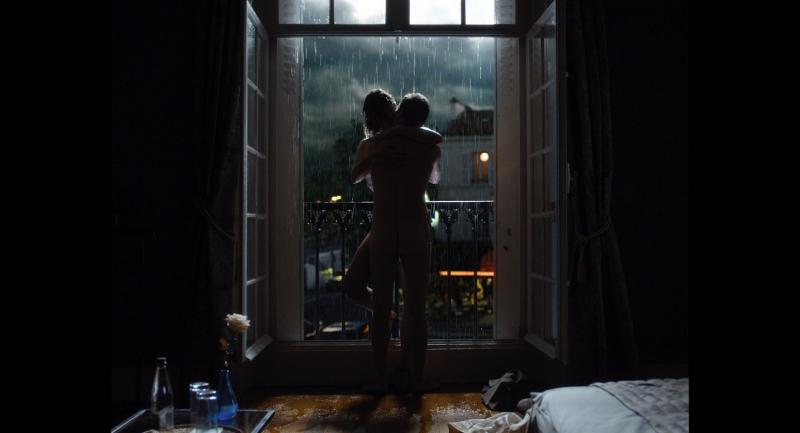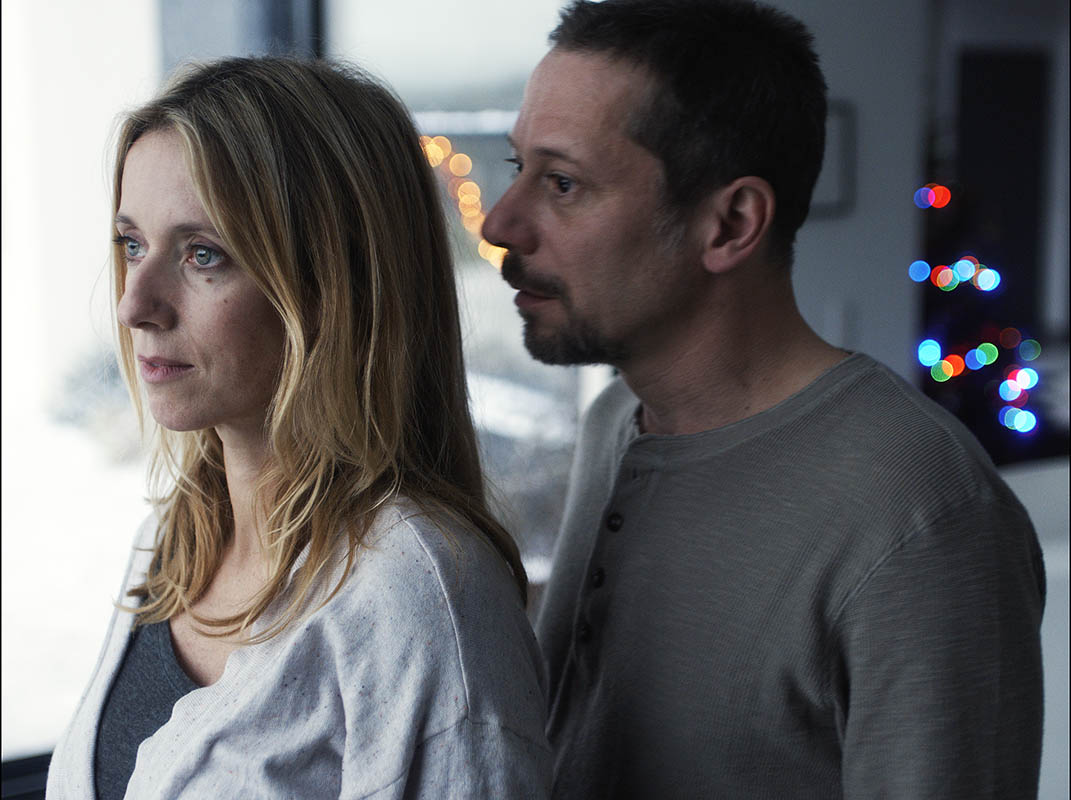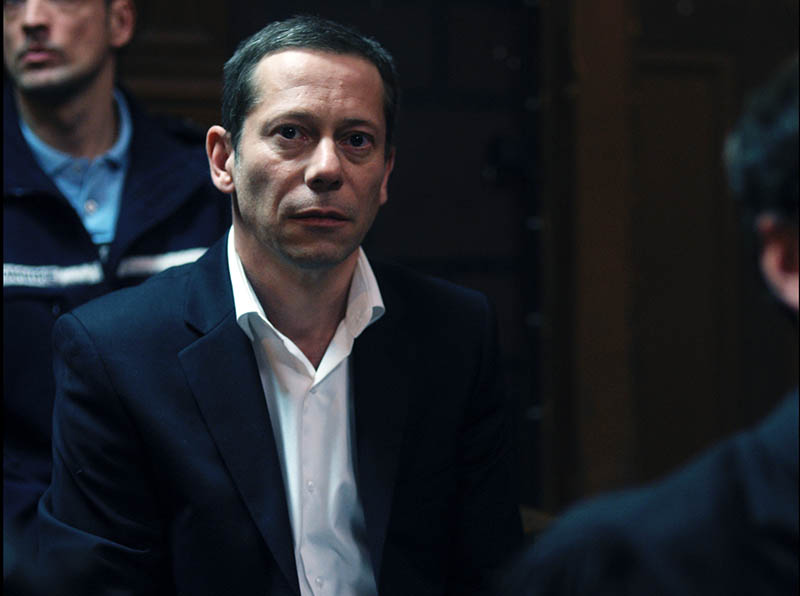The Blue Room | reviews, news & interviews
The Blue Room
The Blue Room
Mathieu Amalric stars and directs in a taut adaptation of a Simenon novel

"Did she bite you often?" Julien Gahyde (Mathieu Amalric) is being questioned about his affair in minute detail, over and over again, by lawyers and detectives. This is an ingenious flashback device. We don’t know yet what crime has been committed, but his lover Esther (Stéphanie Cléau) draws blood right at the start of this claustrophobic and ambiguous film, set in a provincial French town somewhere near Poitiers.
Their passion is the grandest thing for miles around: you can sense the frustration behind the unassuming shop-fronts and flat landscapes. La France profonde-ly dull, where everyone knows everyone else’s business. Esther works in the pharmacy owned by her sickly husband. Julien sells farm machinery and lives with his wife Delphine (Léa Drucker, with Amalric, pictured below) and young daughter Suzanne (Mona Jaffart) in a boxy modern house, described by a witness as a baraque de merde – so much more resonant than the "shitty house" of the subtitles. The first steamy scene, which takes place in the blue room of the hotel where the lovers meet, packs a hefty erotic punch, but we’re not allowed to enjoy it for long.
 Amalric is best known as an actor (Quantum of Solace, The Diving Bell and the Butterfly, The Grand Budapest Hotel) but here he directs and stars, as he did in his last feature, Tournée, which won Best Director at Cannes in 2010. The Blue Room appealed because he wanted something with a fast turn-around which would give him a break from his ongoing mega-project, the adaptation of Le Rouge et Le Noir. Cléau, with whom he wrote the script, adapted very faithfully from a short 1963 Georges Simenon novel, is his real-life partner. In the film they’ve been friends since childhood, but he only recently returned to the area and they haven’t seen each other for years. When her car gets a puncture and he passes by, she’s in there fast. "You kissed all the girls but me," she says, remembering schoolyard jealousies and, ominously, how she racked her brains for ways to make a rival suffer.
Amalric is best known as an actor (Quantum of Solace, The Diving Bell and the Butterfly, The Grand Budapest Hotel) but here he directs and stars, as he did in his last feature, Tournée, which won Best Director at Cannes in 2010. The Blue Room appealed because he wanted something with a fast turn-around which would give him a break from his ongoing mega-project, the adaptation of Le Rouge et Le Noir. Cléau, with whom he wrote the script, adapted very faithfully from a short 1963 Georges Simenon novel, is his real-life partner. In the film they’ve been friends since childhood, but he only recently returned to the area and they haven’t seen each other for years. When her car gets a puncture and he passes by, she’s in there fast. "You kissed all the girls but me," she says, remembering schoolyard jealousies and, ominously, how she racked her brains for ways to make a rival suffer.
Esther tells him, to his surprise – he had always thought she was above him, both socially and physically – that she’s been longing for him since their schooldays. They make love in the woods and soon they’re meeting every week in the hotel near the pharmacy. She leaves a red towel out on the balcony as a sign. Taller and more confident than him, she seems to have plans for the future. "Could you really spend your whole life with me? If I became free, would you free yourself too?" she asks. "Sure," he replies, unconvincingly. He seems only half present.
 "Life is different when you live it and when you go back over it after," says Julien dreamily during a police interrogation (Amalric as Julien in court, pictured left). And as we observe his life unfold, we become less sure about everything, both before and after. Does the pale, unassuming Delphine have suspicions about the affair? Is he trying to drown her or just being playful when he pushes her under the waves? Is he innocent, guilty, or in denial? There’s an undercurrent of violence, but nothing is clear, apart from his hunted, dazed expression, increased in impact by the almost square 1.33 format used by cinematographer Christophe Beaucarne. He’s a man without qualities apart from a creepy, fawning slyness, and Almaric does him proud.
"Life is different when you live it and when you go back over it after," says Julien dreamily during a police interrogation (Amalric as Julien in court, pictured left). And as we observe his life unfold, we become less sure about everything, both before and after. Does the pale, unassuming Delphine have suspicions about the affair? Is he trying to drown her or just being playful when he pushes her under the waves? Is he innocent, guilty, or in denial? There’s an undercurrent of violence, but nothing is clear, apart from his hunted, dazed expression, increased in impact by the almost square 1.33 format used by cinematographer Christophe Beaucarne. He’s a man without qualities apart from a creepy, fawning slyness, and Almaric does him proud.
In Simenon’s original, the question of guilt is as muddied, though the character of Julien is more obviously conflicted and lapses into a detached, semi-vegetative state while awaiting trial. Amalric has said that he wanted to remove the idea of Julien being a willing victim. He aims for what he calls the "permanent pleasure of doubt" and he succeeds – but sometimes the doubt is alienating and we long for some of the passion we saw in that blue room at the start.
Overleaf: watch the trailer for The Blue Room
rating
Explore topics
Share this article
The future of Arts Journalism
You can stop theartsdesk.com closing!
We urgently need financing to survive. Our fundraising drive has thus far raised £49,000 but we need to reach £100,000 or we will be forced to close. Please contribute here: https://gofund.me/c3f6033d
And if you can forward this information to anyone who might assist, we’d be grateful.

Subscribe to theartsdesk.com
Thank you for continuing to read our work on theartsdesk.com. For unlimited access to every article in its entirety, including our archive of more than 15,000 pieces, we're asking for £5 per month or £40 per year. We feel it's a very good deal, and hope you do too.
To take a subscription now simply click here.
And if you're looking for that extra gift for a friend or family member, why not treat them to a theartsdesk.com gift subscription?
more Film
 Steve review - educator in crisis
Cillian Murphy excels as a troubled headmaster working with delinquent boys
Steve review - educator in crisis
Cillian Murphy excels as a troubled headmaster working with delinquent boys
 Can I get a Witness? review - time to die before you get old
Ann Marie Fleming directs Sandra Oh in dystopian fantasy that fails to ignite
Can I get a Witness? review - time to die before you get old
Ann Marie Fleming directs Sandra Oh in dystopian fantasy that fails to ignite
 Happyend review - the kids are never alright
In this futuristic blackboard jungle everything is a bit too manicured
Happyend review - the kids are never alright
In this futuristic blackboard jungle everything is a bit too manicured
 Robert Redford (1936-2025)
The star was more admired within the screen trade than by the critics
Robert Redford (1936-2025)
The star was more admired within the screen trade than by the critics
 Blu-ray: The Sons of Great Bear
DEFA's first 'Red Western': a revisionist take on colonial expansion
Blu-ray: The Sons of Great Bear
DEFA's first 'Red Western': a revisionist take on colonial expansion
 Spinal Tap II: The End Continues review - comedy rock band fails to revive past glories
Belated satirical sequel runs out of gas
Spinal Tap II: The End Continues review - comedy rock band fails to revive past glories
Belated satirical sequel runs out of gas
 Downton Abbey: The Grand Finale review - an attemptedly elegiac final chapter haunted by its past
Noel Coward is a welcome visitor to the insular world of the hit series
Downton Abbey: The Grand Finale review - an attemptedly elegiac final chapter haunted by its past
Noel Coward is a welcome visitor to the insular world of the hit series
 Islands review - sunshine noir serves an ace
Sam Riley is the holiday resort tennis pro in over his head
Islands review - sunshine noir serves an ace
Sam Riley is the holiday resort tennis pro in over his head
 theartsdesk Q&A: actor Sam Riley on playing a washed-up loner in the thriller 'Islands'
The actor discusses his love of self-destructive characters and the problem with fame
theartsdesk Q&A: actor Sam Riley on playing a washed-up loner in the thriller 'Islands'
The actor discusses his love of self-destructive characters and the problem with fame
 Honey Don’t! review - film noir in the bright sun
A Coen brother with a blood-simple gumshoe caper
Honey Don’t! review - film noir in the bright sun
A Coen brother with a blood-simple gumshoe caper
 The Courageous review - Ophélia Kolb excels as a single mother on the edge
Jasmin Gordon's directorial debut features strong performances but leaves too much unexplained
The Courageous review - Ophélia Kolb excels as a single mother on the edge
Jasmin Gordon's directorial debut features strong performances but leaves too much unexplained

Add comment